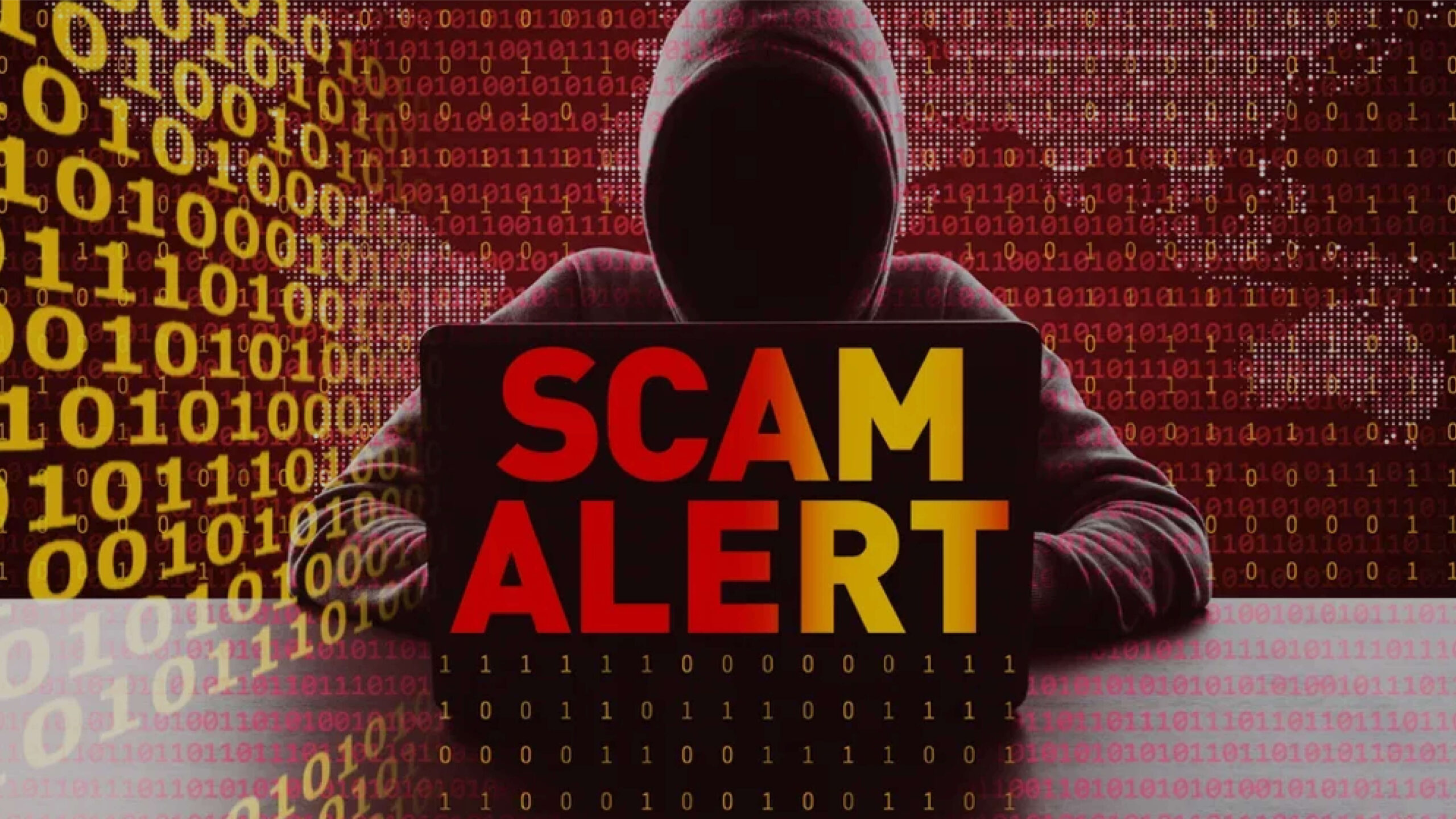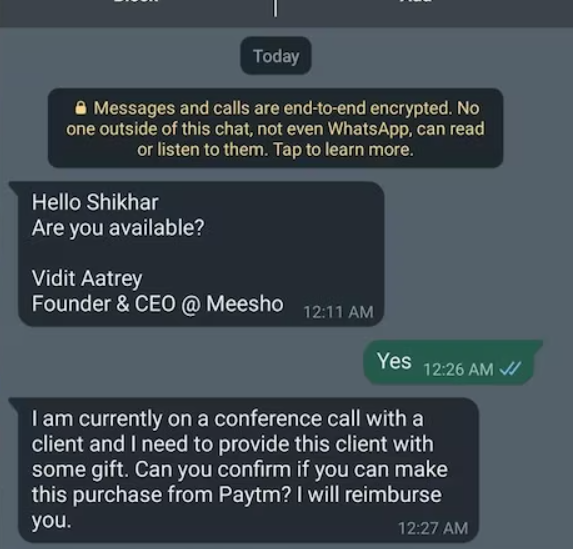Introduction: Recent weeks have seen allegations of a fresh phishing scheme that targets Meesho resellers. The scam involves con artists pretending to be Vidit Aatrey, CEO of Meesho, and asking resellers to send money to them. In this blog post, we’ll look more closely at this scam and share some effective tips on how to avoid falling for it.
The Most Current Meesho Scam Pretending to be CEO Vidit Aatrey Millions of people utilise the well-liked reselling portal Meesho in India. Unfortunately, because of its popularity, fraudsters have started to use phishing to target Meesho resellers. One of the most recent scams involves con artists pretending to be Vidit Aatrey, CEO of Meesho, and asking resellers to send money to them.
How is the Scam Operated?
The Meesho scam involves con artists impersonating Vidit Aatrey, the CEO of Meesho, and asking resellers to send money to them. Typically, they message a Meesho reseller requesting an urgent money transfer to a certain bank account. As additional assurance that the transfer is legitimate, the message might even include a screenshot of a bank transfer made by Vidit Aatrey.
The scammer will send a message thanking the reseller for the transfer and offering to reimburse them after the reseller has sent the money. But the fraudster never pays the reseller back, so they are out of pocket. To collect personal information from Meesho resellers, such as bank account information or login, They might make phoney login pages that look like the Meesho website or send emails requesting this information.
Warning Signs: How to Spot a Meesho Phishing Scam
Several warning signs indicate that a message or email may be a Meesho phishing scam. Here are some of them:
● Urgent requests for funds: If the message urges you to transfer funds urgently, this may be a warning sign that it is a scam. Genuine requests for funds from Meesho will typically be made through official channels, and there will be time to verify the request before transferring money.
● Requests for personal information: If the message asks for personal information, such as your bank account details or login credentials, this is a warning sign that it may be a phishing scam. Meesho will never ask for personal information in this way, and you should never provide it to anyone who requests it.
● Unusual or suspicious sender address: Check the email address of the sender. If it is unusual or suspicious, then it is likely a scam. To mislead recipients, scammers frequently generate phoney email addresses that replicate genuine ones.
● Poor grammar or spelling mistakes: If the message contains poor grammar or spelling mistakes, this may be a warning sign that it is a scam. Genuine messages from Meesho will typically be well-written and professional.
● Unexpected messages: If you receive a message from Meesho or Vidit Aatrey that you were not expecting, this may be a warning sign that it is a scam. Scammers often send unsolicited messages in an attempt to catch recipients off guard.
It is important to be vigilant and verify the authenticity of any messages or requests that you receive from Meesho or Vidit Aatrey. If you are unsure whether a message is genuine or a scam, contact Meesho directly to verify the request before taking further action.
Protecting Yourself from Meesho Phishing Scams
Here are some steps you can take to protect yourself from Meesho phishing scams:
Be mindful of unsolicited messages: Be sceptical of unsolicited messages or emails that appear to be from Vidit Aatrey or Meesho. Scammers usually use this tactic to mislead victims into transferring money or personal information.
● Verify requests: If you receive a message or email requesting funds or personal information, verify it with Meesho directly. Use official channels to contact the company, such as their website or customer support hotline.
● Check sender information: Check the email address and sender information for any unusual or suspicious details. Scammers frequently design fake email addresses or usernames that look like those of real businesses or people.
● Keep personal information private: Never share your personal information, including login credentials or bank account details, with anyone who requests it. Meesho will never ask for this information through unsolicited messages or emails.
● Keep your software updated: Keep your computer, phone, and other devices up-to-date with the latest security patches and software updates. This can help protect you from security vulnerabilities that scammers may exploit.
● Use two-factor authentication: Enable two-factor authentication on your Meesho account to add an extra layer of security to your login process.
By following these suggestions, you may defend yourself from Meesho phishing schemes and other forms of online fraud. Always be vigilant of unsolicited messages and double-check any requests before responding.
What to Do If You Fall Victim to a Meesho Phishing Scam
If you have fallen victim to a Meesho phishing scam, here are some steps you should take immediately:
● Reach out to Meesho: To report the scam and communicate any information regarding the bogus message or email you received, contact Meesho immediately. They can assist you in recouping any lost money or avoid additional harm.
● Change your passwords: Change your passwords for all accounts that use the same password as your Meesho account. This implements to any hacked accounts, such as email addresses, social media profiles, and other accounts.
● Keep an eye on your accounts: Keep an eye on your credit card and bank statements for unauthorised activities. If you observe anything strange, report it immediately to your bank or credit card provider.
● Report the scam: Report the scam to the appropriate authorities, such as the local police or the cyber crime department. They may be able to investigate and act against the scammers.
● Upskill yourself: upskill yourself and learn how to protect yourself from phishing scams and other types of online fraud. This can help prevent you from falling victim to future scams.
Conclusion: It is important to act quickly if you fall victim to a Meesho phishing scam. Following these steps reduces the damage and increases your chances of recovering any lost funds. Meesho phishing scheme poses a major risk to the safety and privacy of platform users. Scammers often use tactics to trick users into providing personal information or transferring funds, including posing as Meesho executives or using fake websites and email addresses.
To protect yourself from Meesho phishing scams, you must be vigilant and verify any requests you receive through official channels. Never share your personal information or transfer funds in response to unsolicited messages or emails.
Reference:
https://www.businesstoday.in/technology/news/story/i-will-reimburse-you-scammers-posing-as-meesho-ceo-vidit-aatrey-in-latest-phishing-scam-376647-2023-04-09
https://www.hindustantimes.com/technology/scam-alert-meesho-employee-flags-text-from-ceo-for-payment-101680961650900.html
https://www.indiatoday.in/technology/news/story/new-scam-alert-scammers-targeting-employees-by-posing-boss-2357959-2023-04-10
Meesho Employee Gets Scam Message For Payment From Person Posing As CEO
Author : Ms. Tanushree Saxena, Trainer, CyberPeace





